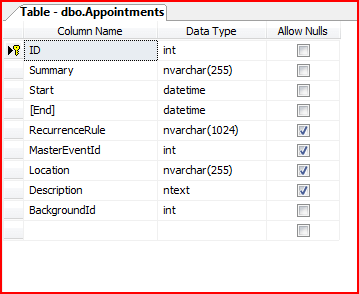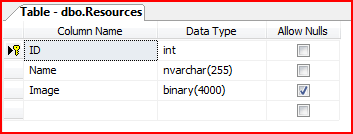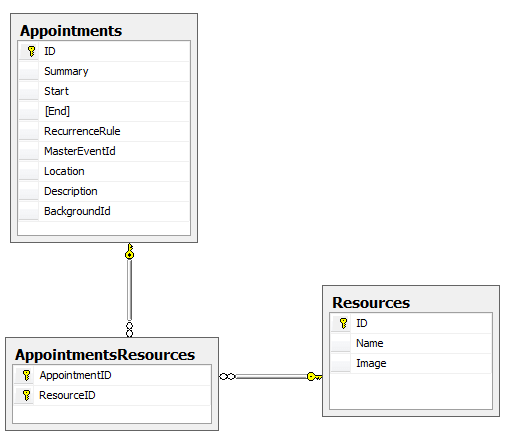Sample Database
To kick start your development, a sample database for RadScheduler can be found in your installation folder of Telerik UI for WinForms (under the \Examples\DataSources folder). The name of the file is SchedulerData.mdf. The sample database for RadScheduler contains the most simple scenario - two tables which can be used to bind the control to appointments and resources information.
Database Structure
Here is the structure of the Appointments table:

Note that the mandatory fields for RadScheduler are ID, Summary, Start and End (those fields which do not allow null values to be stored in the database).
Here is the structure of the Resources table:

And the cross relations table that allows many-to-many relations:

The general overview of the database is on the following diagram:

The AppointmentsResources table has relations to the primary keys of the AppointmentsResources and Resources tables.
You can use schema script to automatically add the Scheduler data tables to an existing database. Here is the script that creates the AppointmentsResources data table:
USE [SchedulerData]
GO
/****** Object: Table [dbo].[AppointmentsResources] ******/
SET ANSI_NULLS ON
GO
SET QUOTED_IDENTIFIER ON
GO
CREATE TABLE [dbo].[AppointmentsResources](
[AppointmentID] [int] NOT NULL,
[ResourceID] [int] NOT NULL,
CONSTRAINT [PK_AppointmentsResources] PRIMARY KEY CLUSTERED
(
[AppointmentID] ASC,
[ResourceID] ASC
)WITH (PAD_INDEX = OFF, IGNORE_DUP_KEY = OFF) ON [PRIMARY]
) ON [PRIMARY]
GO
ALTER TABLE [dbo].[AppointmentsResources] WITH CHECK ADD CONSTRAINT [AppointmentsResources_Appointments] FOREIGN KEY([AppointmentID])
REFERENCES [dbo].[Appointments] ([ID])
ON DELETE CASCADE
GO
ALTER TABLE [dbo].[AppointmentsResources] CHECK CONSTRAINT [AppointmentsResources_Appointments]
GO
ALTER TABLE [dbo].[AppointmentsResources] WITH CHECK ADD CONSTRAINT [AppointmentsResources_Resources] FOREIGN KEY([ResourceID])
REFERENCES [dbo].[Resources] ([ID])
GO
ALTER TABLE [dbo].[AppointmentsResources] CHECK CONSTRAINT [AppointmentsResources_Resources]
Here is the script that creates the Resources data table:
USE [SchedulerData]
GO
/****** Object: Table [dbo].[Resources] ******/
SET ANSI_NULLS ON
GO
SET QUOTED_IDENTIFIER ON
GO
SET ANSI_PADDING ON
GO
CREATE TABLE [dbo].[Resources](
[ID] [int] IDENTITY(1,1) NOT NULL,
[Name] [nvarchar](255) COLLATE SQL_Latin1_General_CP1_CI_AS NOT NULL,
[Image] [binary](4000) NULL,
CONSTRAINT [PK_Resources] PRIMARY KEY CLUSTERED
(
[ID] ASC
)WITH (PAD_INDEX = OFF, IGNORE_DUP_KEY = OFF) ON [PRIMARY]
) ON [PRIMARY]
GO
SET ANSI_PADDING OFF
Here is the script that creates the Appointments data table:
USE [SchedulerData]
GO
/****** Object: Table [dbo].[Appointments] ******/
SET ANSI_NULLS ON
GO
SET QUOTED_IDENTIFIER ON
GO
CREATE TABLE [dbo].[Appointments](
[ID] [int] IDENTITY(1,1) NOT NULL,
[Summary] [nvarchar](255) COLLATE SQL_Latin1_General_CP1_CI_AS NOT NULL,
[Start] [datetime] NOT NULL,
[End] [datetime] NOT NULL,
[RecurrenceRule] [nvarchar](1024) COLLATE SQL_Latin1_General_CP1_CI_AS NULL,
[MasterEventId] [int] NULL,
[Location] [nvarchar](255) COLLATE SQL_Latin1_General_CP1_CI_AS NULL,
[Description] [ntext] COLLATE SQL_Latin1_General_CP1_CI_AS NULL,
[BackgroundId] [int] NOT NULL CONSTRAINT [DF_Appointments_BackgroundId] DEFAULT ((1)),
CONSTRAINT [PK_Appointments] PRIMARY KEY CLUSTERED
(
[ID] ASC
)WITH (PAD_INDEX = OFF, IGNORE_DUP_KEY = OFF) ON [PRIMARY]
) ON [PRIMARY] TEXTIMAGE_ON [PRIMARY]